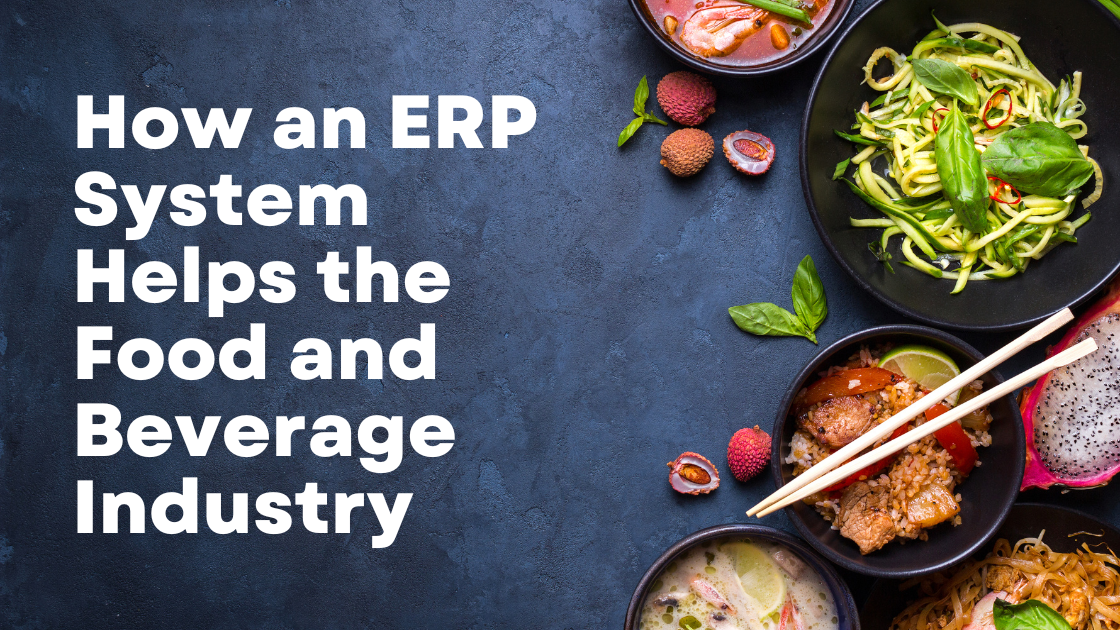The food and beverage industry is one of the largest sectors globally, and it faces many challenges that can impact the success of businesses. From supply chain disruptions to regulatory compliance, maintaining quality standards, and managing inventory, there is a lot to keep track of. Fortunately, an effective solution to streamline operations, improve productivity, and meet compliance standards is an Enterprise Resource Planning (ERP) system.
An ERP system is a software tool designed to integrate various functions within a business, including finance, inventory, procurement, and human resources, into a single, unified system. In the food and beverage industry, these systems offer customized features to address industry-specific needs like perishable goods management, recipe formulation, and compliance with food safety regulations. Below, we will discuss the ways ERP systems benefit the food and beverage sector and how they help businesses manage the complex operations that define this industry
What is an ERP System?
Enterprise Resource Planning (ERP) systems are comprehensive software solutions that help businesses integrate different aspects of their operations into one unified platform. They centralize data across departments such as finance, human resources, supply chain, production, sales, and inventory management. This centralization enables businesses to make informed, data-driven decisions that improve efficiency and reduce operational costs.
In the food and beverage industry, ERP systems are designed to meet specific needs that go beyond traditional business management tasks. They track perishable inventory, ensure product traceability, and help businesses maintain quality standards. By using ERP, food and beverage companies can ensure all departments work together efficiently, leading to smoother operations and a better understanding of the overall business performance.
Challenges Faced by the Food and Beverage Industry
The food and beverage sector is filled with unique challenges that make managing operations more complex than in many other industries. Some of the major challenges include:
1. Regulatory Compliance and Food Safety
Food safety regulations are strict and vary from country to country. Companies must adhere to numerous standards and regulations, including labeling, health certifications, traceability, and safety audits. Failure to comply with these regulations can result in fines, recalls, or even closure of the business. Ensuring compliance with such regulations is a constant challenge.
2. Perishable Goods and Inventory Management
One of the primary concerns in the food industry is managing perishable goods. Products with short shelf lives need to be tracked and rotated to avoid spoilage. Managing inventory efficiently is crucial to reduce waste, prevent stockouts, and avoid overproduction. ERP systems help manage inventory levels in real time, track expiration dates, and manage the supply chain, so businesses can make better decisions regarding stock management.
3. Supply Chain Issues
Supply chain disruptions, such as delays in shipments, shortages of raw materials, or problems with transportation, can have a significant impact on food production. The COVID-19 pandemic, for example, exposed vulnerabilities in global supply chains. An ERP system can help food businesses forecast demand, track supplier performance, and identify potential bottlenecks before they become problems.
4. Quality Control
Consistency and quality are key in the food and beverage industry. Companies need to ensure that every batch meets the required safety and quality standards. Any variation in the product’s quality could damage the brand reputation and lead to customer dissatisfaction. ERP systems monitor production, track quality control processes, and ensure adherence to food safety standards.
How ERP Systems Help Overcome These Challenges
ERP systems are a powerful tool for overcoming the challenges faced by the food and beverage industry. Let’s explore how ERP solutions help solve the common problems that this sector faces:
1. Regulatory Compliance and Food Safety
ERP systems ensure compliance by automating the generation of reports, tracking ingredients, and maintaining detailed records of every production batch. With ERP, food companies can track products at every stage of production and distribution, from the farm to the consumer. In case of a recall, an ERP system can instantly identify the affected products and their locations, ensuring the process is swift and efficient.
ERP systems also integrate with other systems, such as those for food safety and quality management, to help businesses comply with laws and certifications like Hazard Analysis and Critical Control Points (HACCP), FDA regulations, and more. This reduces the risk of human error and ensures that compliance requirements are met without delay.
2. Inventory Management
One of the main advantages of an ERP system is its ability to provide real-time insights into inventory levels. For the food and beverage industry, this is especially critical for managing perishable items. An ERP system can track product expiration dates and notify managers when products need to be used or removed from shelves.
Additionally, ERP systems offer batch tracking and lot control, which means that food items can be traced from raw material to finished product. This level of transparency ensures that businesses have accurate inventory data, which can reduce food waste, minimize stockouts, and improve order fulfillment.
3. Optimized Production Planning
ERP systems help businesses optimize production planning by providing insights into inventory levels, supplier lead times, and demand forecasts. By analyzing data from various departments, an ERP system can help businesses align production with demand, preventing overproduction and reducing the likelihood of stockouts.
Moreover, ERP systems enable companies to streamline recipe formulation, maintain ingredient consistency, and track production costs more effectively. Businesses can improve production scheduling to minimize downtime, increase resource utilization, and ensure that products are delivered on time.
4. Improved Supply Chain Management
An ERP system integrates every aspect of the supply chain, from procurement and supplier management to transportation and logistics. ERP systems allow businesses to track the status of raw material orders, optimize supplier relationships, and manage delivery schedules.
With integrated supply chain management, companies can mitigate risks such as supplier delays, transportation issues, or stockouts by improving visibility across the entire supply chain. An ERP system also provides historical data, enabling businesses to predict potential future disruptions and take preventative actions.
5. Quality Control and Assurance
Quality control is a critical concern in the food and beverage industry. ERP systems include tools for monitoring and maintaining quality standards at every stage of production. By setting up automated quality checks, businesses can ensure products meet the required specifications and are consistent from batch to batch.
An ERP system can track quality metrics, such as temperature and humidity during storage and transport, to ensure that food products are handled correctly. This helps reduce spoilage, improve safety, and maintain customer trust in the brand.
Key Benefits of ERP for Food and Beverage Companies
Implementing an ERP system provides several benefits for food and beverage businesses:
1. Improved Efficiency
By automating routine tasks such as order processing, inventory management, and reporting, ERP systems help businesses improve efficiency and reduce human errors. Real-time data access means that employees can make faster decisions and respond to issues as they arise.
2. Cost Savings
With improved inventory management, production scheduling, and supply chain optimization, ERP systems help businesses save money by reducing waste, avoiding stockouts, and ensuring the most efficient use of resources. The ability to monitor real-time data and improve operational processes directly leads to cost reduction.
3. Data-Driven Decision-Making
The real-time data provided by ERP systems enables businesses to make smarter decisions based on actual performance rather than guesswork. Managers can analyze trends, predict demand, and adjust production and inventory levels accordingly. This leads to better business forecasting and more accurate planning.
4. Scalability
As the food and beverage industry continues to grow, businesses need systems that can scale with them. ERP systems provide scalability, allowing businesses to grow without the need for constant system upgrades or overhauls. Whether a business is opening new locations, expanding production capacity, or entering new markets, ERP systems grow with the company.
Best ERP Software for the Food and Beverage Industry
Choosing the right ERP system is crucial for the food and beverage industry, which faces unique challenges like perishable inventory, strict regulations, and the need for real-time decision-making. Here are five top ERP solutions, with Odoo ERP standing out as the best option:
1. Odoo ERP
Odoo is the best choice for food and beverage businesses due to its modular and affordable nature. It offers industry-specific features like inventory management, recipe tracking, and batch traceability, ensuring compliance with food safety regulations. Odoo’s scalability allows businesses to start small and expand as needed. Its user-friendly interface and real-time data make decision-making easier and more efficient.
2. SAP Business One
SAP Business One is a comprehensive ERP with specialized modules for food and beverage businesses. It helps manage inventory, production planning, and quality control. However, it is expensive and may be too complex for smaller businesses.
3. Microsoft Dynamics 365
Microsoft Dynamics 365 offers a cloud-based solution that integrates supply chain, inventory, and production management. It also includes advanced analytics. While powerful, it can be complex and costly for smaller food businesses.
Why Odoo is the Best ERP for Food and Beverage Businesses
Odoo stands out as the best ERP for food and beverage companies due to its affordability, ease of use, and customization options. It provides all the essential features for managing inventory, production, and compliance while allowing businesses to scale as they grow. Odoo is an ideal choice for companies of all sizes looking for an efficient, flexible, and cost-effective ERP solution.
For those interested in implementing Odoo ERP, partnering with Odoo ERP development services in India can provide expert support and cost-effective solutions.
Looking Ahead: The Future of Food and Beverage Operations with Odoo ERP
In the food and beverage industry, selecting the right ERP system is crucial for streamlining operations, improving efficiency, and ensuring compliance with regulations. While there are several strong options available, Odoo ERP emerges as the best choice due to its affordability, flexibility, and scalability. It offers essential features like inventory management, recipe tracking, and batch traceability, all tailored to the specific needs of food and beverage businesses.
Odoo’s user-friendly interface, real-time data insights, and ability to grow with your business make it a top contender for companies looking to optimize their operations. By choosing Odoo ERP, food and beverage businesses can enhance productivity, improve decision-making, and maintain compliance, all while reducing costs and complexity.





